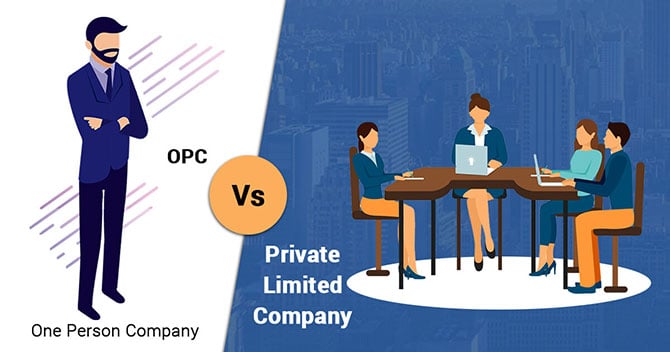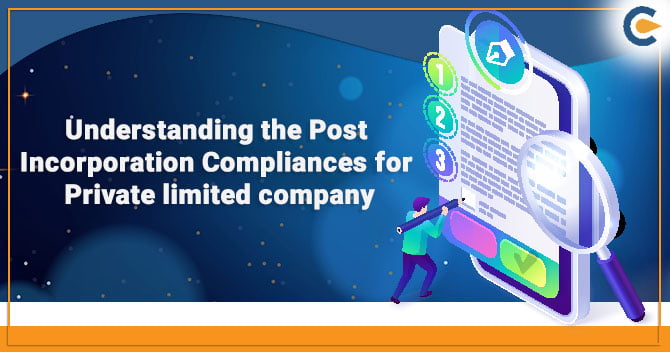Are you thinking of starting a venture, but you are not sure about your funding status that whether you will be able to solely meet the initial financial requirements of your business or not. You might get muddle-headed whether to opt for OPC or private Limited Company. The answer is quite simple if you are looking for personal independence of yours and wish to have sufficient control over the entire operations and administration of the business – then go for the OPC (One Person Company). While if you are looking that your company is funded at the nascent stage of its operations, then go for the Private Limited Company. The choice is yours; you need to be clear in your decision. After all, you cannot get all the benefits in a single package.
Though One Person Company and Private Limited Company are entirely two different business entities, both of them are governed by the Companies Act, 2013[1] . Now, let’s get in the in-depth view of the OPC versus Private Limited Company.
OPC versus Private Limited Company
The difference between OPC and private limited Company is given as below:
Shareholders in the company
In OPC, only one person and one shareholder is required to incorporate and run the company. Moreover, the Director and the shareholder in the One Person Company is the same individual who holds the 100% shares in the company.
While in the Private Limited Companies, a minimum of 2 shareholders and a maximum of 200 shareholders are required during the incorporation. Also, the shareholders of the private limited company can be any entity.
Funds Raising
Fundraising is quite an intricate part of an OPC as there is only one member who has the entire financial burden on his/her shoulder.
Whereas in the private Limited Company, they can get funding from various venture capitals, angel investments, etc.
Board of Directors
As per the name OPC (One Person Company), we have only one member in the company that means there is no need to hold any such Annual General Meeting (AGM) or Board meetings.
Contrary to this, in a private limited company, there is a Board of Directors which consists of a minimum of 2 Directors and a maximum of seven directors at the time of incorporation. Also, it is mandatory to convene 4 Board meetings and 1 AGM in a financial year.
Investment by the NRI (Non-Resident Indian) or Foreign National
One of the best advantages of having a Private limited company is that foreign nationals and NRIs can quickly start the PLC in India. Also, 100 percent FDI under the automatic approval route is accessible in the Private Limited Company.
But in the OPC, only the citizens of India are allowed to commence the company. Henceforth, One Person Company is not eligible for Foreign Direct Investment.
Business Activities
Certain activities like an investment in securities, non-banking financial activities are restricted in the OPC. However, a company registered as a Private Limited Company can engage in such activities taking the approval of the concerned authority.
Compliance Requirements
There are certain similarities in the Compliance requirements of both the OPC and The Private Limited Company. Both the OPC and the PLC need to file the annual returns with the MCA (Ministry of Corporate Affairs) and Income Tax returns with the Income Tax Department. Besides these similarities, both the entities need to get their accounts audited every year. Let’s have a look at the few exemptions of the OPC –
- According to Section 2(40) of the Companies act, 2013, In OPC, it is not mandatory to include a Cash Flow statement in their financial statements.
- As per Section 134(1) of the Companies act, 2013, only one Director needs to sign the financial statements irrespective of a Nominee director.
- According to Section 92(1) of the Companies act, 2013, the Director can sign the annual return in case the CS (Company Secretary) is absent.
- In accordance with Section 173(5), the provisions of section 173 and section 174 don’t apply if the OPC has only one Director.
Section 173(5) – Meetings of the Board
Section 174 – Quorum for the meetings of the Board
Controls and Ownership of the Company
In One Person Company, the sole member that is the Director has the complete ownership of the company, and it is not shared with any other person.
While in the case of the private limited company, the ownership is divided between two members. Also, based on the ratio of shares held by each member, the voting power is divided.
Company’s Establishment
The cost involved in the formation of One Person Company and the Pvt Company is the same, but the cost involved in the compliances is somehow different.
In OPC, the compliance cost is less in comparison to the OPC. The filing of each form requires INR 500, which in turn reflects the higher compliance cost of the OPC.
Whereas in the Private Limited Company, the compliance cost is more than the OPC.
Conclusion
Both OPC (One Person Company) and the Pvt Ltd Company have certain advantages and disadvantages, it’s totally up to you, what kind of company you want to commence. In a nutshell, we can suggest that you can go to the Private Limited Company as it has other certain advantages of uninterrupted existence and fixed liability.
Read our article:A Guide on Exemptions for Private Limited Companies











